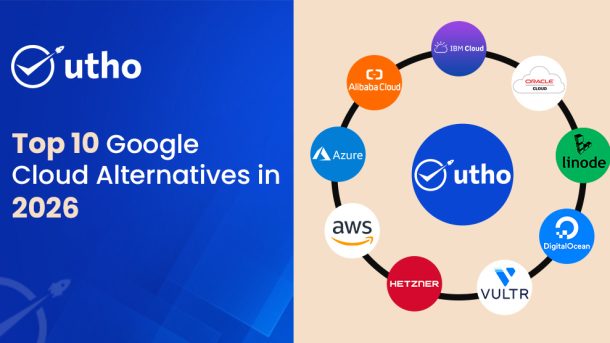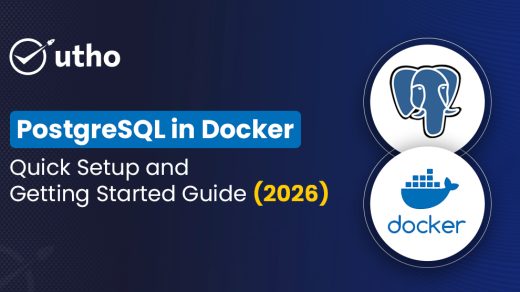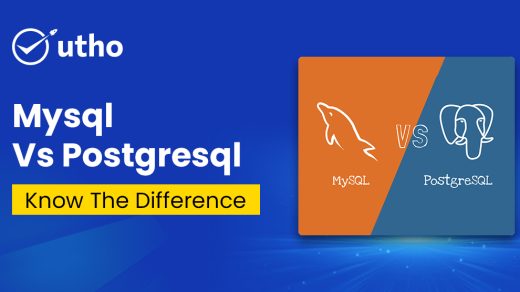In 2026, cloud computing is vital to digital infrastructure. It helps businesses scale, innovate, and manage resources efficiently. Google Cloud is a leading provider in this space. It offers computing, storage, and advanced AI services. As businesses evolve, many are seeking a Google Cloud alternative. They want one that better suits their needs, due to cost, regional preferences, or specialized features.
Why Consider a Google Cloud Alternative?
There are several reasons why businesses might explore alternatives to Google Cloud:
- Cost Efficiency: Google Cloud can be costly for some workloads. This is especially true for startups and SMEs that must manage their budgets. Many Google Cloud alternatives have low-cost, competitive pricing models. They reduce costs without losing key features.
- Specialized Services: Google Cloud is versatile. But, some providers offer specialized, industry-specific solutions. These may better meet a company's unique needs. For example, they may improve security for healthcare data. Or, they may boost performance for analytics.
- Data Residency and Compliance: For some businesses, local data centers and compliance rules are vital. They operate in specific regions. Some Google Cloud alternatives have better regional coverage or support for data residency laws.
- Customer Support: Personalized support is often a key factor, especially for businesses that are not yet cloud experts. Some Google Cloud alternatives offer more hands-on help. This makes it easier for businesses to migrate and manage their cloud environments.
What Factors to Consider When Choosing a Google Cloud Alternative?
To choose the best Google Cloud alternative, assess several key factors. They must align with your business goals.
- Performance and Speed: Choose providers with low latency and fast data transfer. This is vital if you need real-time data processing or serve a global customer base.
- Pricing Models: Evaluate the pricing structures, including hidden costs like data egress fees. Some providers offer more transparent or predictable pricing, making it easier to manage costs over time.
- Scalability: As your business grows, your cloud needs will evolve. You must choose a provider that can scale with your operations. You may need more storage, computing power, or advanced AI and machine learning services.
- Security and Compliance: In finance, healthcare, and government, it's vital to choose a provider that meets strict security and compliance standards. Your Google Cloud alternative must have encryption, compliance certifications, and strong security.
- Integration with Existing Tools: Check how well a provider integrates with your existing software, like CRM, databases, and dev tools. A cloud provider with easy integration can streamline workflows and reduce migration issues.
Considering these factors, businesses can choose a Google Cloud alternative. It should fit their needs, budget, and growth plans. Next, we'll explore the top 10 alternatives to Google Cloud in 2026. We'll highlight their unique strengths and best-use scenarios.
List of the Top 10 Google Cloud Alternatives in 2026
- Amazon Web Services (AWS)
- Microsoft Azure
- Utho Cloud
- IBM Cloud
- DigitalOcean
- Alibaba Cloud
- Oracle Cloud Infrastructure (OCI)
- Linode (Akamai)
- Vultr
- Hetzner Cloud
1. Amazon Web Services (AWS)
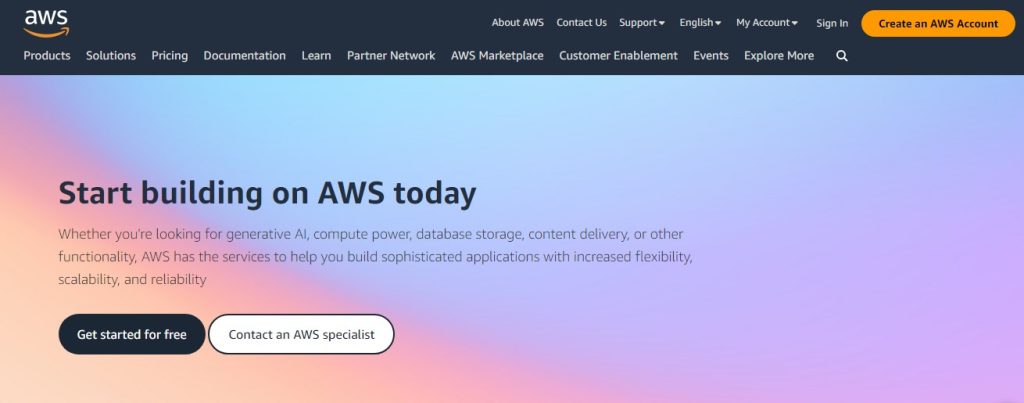
Overview: Amazon Web Services (AWS) is a top Google Cloud alternative. It offers a wide range of services, including computing, storage, databases, and AI/ML. With a vast global infrastructure, AWS ensures low latency and high availability for users around the world.
Key Features:
- AWS has over 200 services. They are fully featured. So, it can meet almost any cloud need, from simple storage to complex AI.
- AWS has data centers in over 25 regions. It provides fast, reliable access to data. This makes it ideal for global businesses.
- Flexible Pricing: AWS's pay-as-you-go pricing and discounts let you tailor costs to your budget.
Best For:
- Large Enterprises: AWS’s scalability and advanced feature set are ideal for large businesses with diverse cloud needs.
- Developers and Startups: Its free tier lets startups and developers experiment before scaling up.
Also read: Top 10 AWS Alternatives for 2026
2. Microsoft Azure
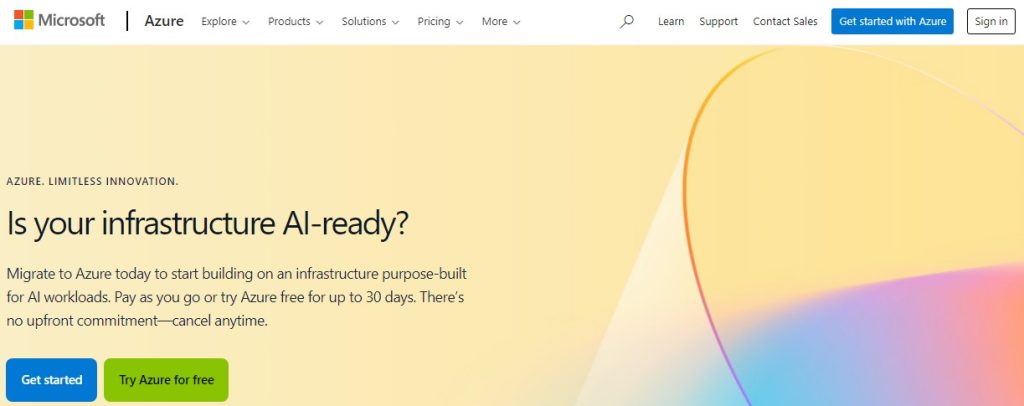
Overview: Microsoft Azure is a top Google Cloud alternative. It's known for its integration with Microsoft's ecosystem and its focus on enterprise solutions. Azure offers a wide range of services, from AI and analytics to IoT, catering to both small businesses and large enterprises.
Key Features:
- Azure works natively with Microsoft tools like Office 365, Active Directory, and Dynamics 365. So, it's a top choice for businesses using the Microsoft ecosystem.
- Hybrid Cloud: Azure Arc lets businesses manage on-prem, multi-cloud, and edge environments with one platform.
- Strong AI and ML Offerings: Azure's AI and ML tools, like Azure Machine Learning and Cognitive Services, are great for businesses wanting to use AI.
Best For:
- Enterprises Using Microsoft Software: Perfect for companies wanting a seamless cloud integration with their existing Microsoft investments.
- Hybrid Cloud Deployments: For businesses that want to mix on-premises systems with cloud resources.
Also read: Top 10 Azure Alternatives for 2026
3. Utho Cloud
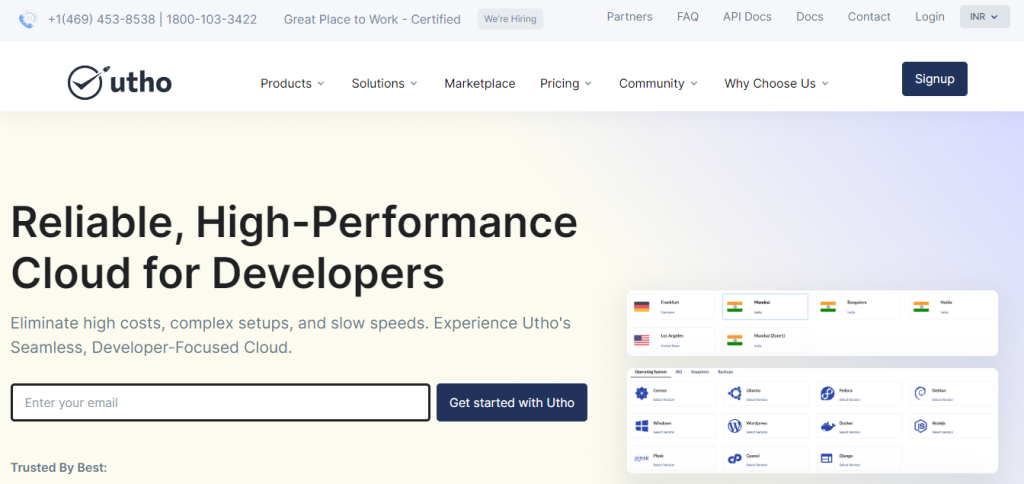
Overview: Utho emerges as a strong Google Cloud alternative, especially tailored for the Indian market. It is a great choice for SMBs seeking cloud solutions. It combines low cost, fast data access, and hands-on support. It avoids the complexities of global hyperscalers.
Key Features:
- Utho's prices can save up to 60%. They are much lower than those of larger providers, like Google Cloud. So, Utho is a good choice for budget-strapped businesses.
- Localized Data Centers: Utho's data centers in India are well-placed. They provide low-latency, fast data access for Indian businesses.
- Hands-On Support: Utho stands out for its personal support. It offers hand-holding help during setup. This ensures a smooth transition to the cloud.
- No Hidden Costs: Utho's clear pricing and terms help businesses manage cash flow without surprises.
Best For:
- SMBs and Startups: Utho is perfect for small firms. It is a cheap, simple solution with local support.
- Indian Businesses: Best for companies in India needing low-latency access and tailored support.
4. IBM Cloud
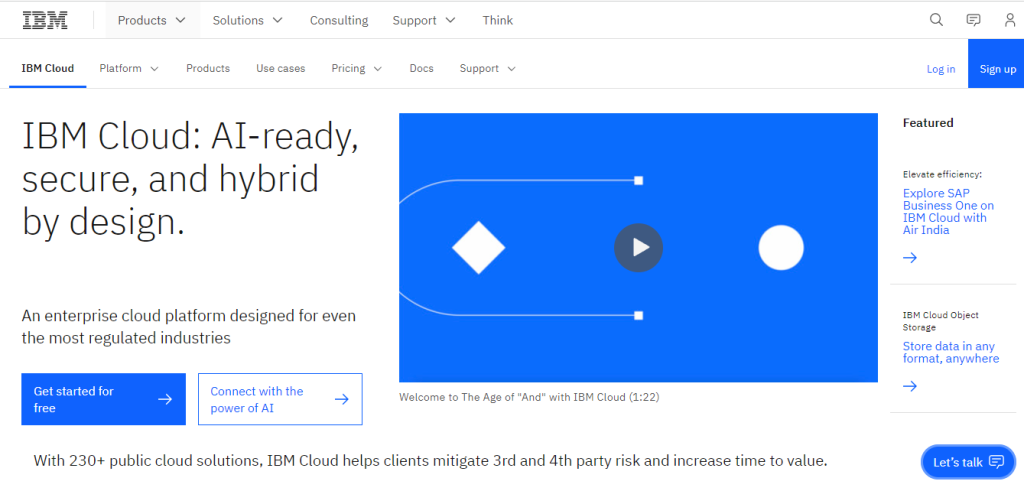
IBM Cloud is known for its security and compliance. Its cloud solutions are enterprise-grade. They are a good alternative to Google Cloud for regulated businesses. IBM Cloud has public and private cloud options. It lets companies build custom environments.
Key Features:
- Enterprise Security: IBM Cloud has strong security features. These include encryption, compliance certifications, and secure networking options.
- AI and Data: IBM's Watson AI and data tools are strong for businesses. They want to use AI for insights.
- Hybrid and Multi-Cloud Flexibility: IBM's Cloud Pak solutions let businesses easily use hybrid and multi-cloud strategies. They can manage resources across different environments.
Best For:
- Regulated Industries: Best for finance, healthcare, and government. They need strict compliance and data security.
- Enterprises Seeking Custom Solutions: Best for companies needing a highly tailored cloud environment.
5. DigitalOcean
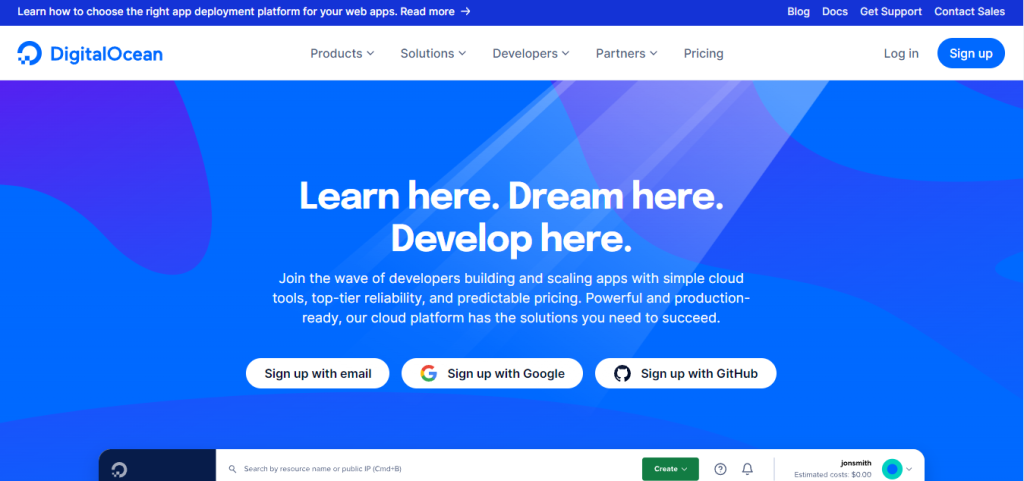
Overview: DigitalOcean is a Google Cloud alternative that appeals primarily to developers, startups, and small businesses due to its simplicity and cost-effectiveness. It offers cloud services, like virtual private servers (Droplets), managed databases, and Kubernetes.
Key Features:
- Developer-Friendly: DigitalOcean has a user-friendly control panel and a simple API. This makes it great for developers and startups.
- Predictable Pricing: It offers transparent, affordable pricing. Clear costs help small businesses manage their budgets.
- Global Data Centers: DigitalOcean has data centers in several regions. They ensure fast data access and scalability.
Best For:
- Developers and Startups: Ideal for those wanting a simple, reliable cloud service without the complexities of larger providers.
- Web Hosting: Ideal for hosting websites, applications, and databases with straightforward management tools.
Also read: Top 10 DigitalOcean Alternatives in 2026
6. Alibaba Cloud
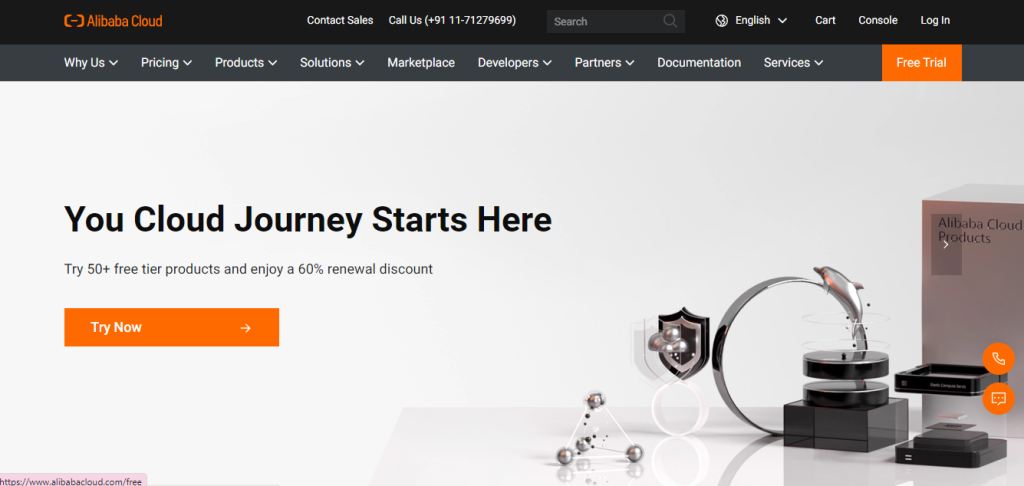
Overview: Alibaba Cloud is a strong alternative to Google Cloud. It is ideal for businesses targeting the Asian market. It offers many cloud computing services, from scalable storage to advanced analytics. This makes it popular with companies in or expanding into the Asia-Pacific region.
Key Features:
- Strong Presence in Asia: Alibaba Cloud has many data centers in China and other Asian countries. They provide low-latency access and meet regional compliance.
- Comprehensive Security: It has strong security features. They include DDoS protection, encryption, and compliance certifications. This makes it suitable for enterprises in regulated industries.
- Alibaba Cloud provides AI, machine learning, and big data tools. They help businesses gain insights from their data.
Best For:
- Businesses with Asian Operations: Ideal for companies looking to expand in the Asia-Pacific region.
- E-commerce and Retail: Alibaba's work with e-commerce giants like Taobao makes it a great choice for retail businesses.
7. Oracle Cloud Infrastructure (OCI)

Overview: Oracle Cloud Infrastructure (OCI) provides high-performance, enterprise-grade cloud services. It focuses on database management. OCI is a good alternative to Google Cloud. It's best for businesses with complex database needs or those using Oracle's software.
Key Features:
- Oracle's Autonomous Database services automate tuning, patching, and backups. This makes it easier for businesses to manage their data.
- High Performance: OCI is for apps needing high, consistent performance. It's ideal for mission-critical workloads.
- Hybrid Cloud Capabilities: Oracle's solutions work well with on-premises systems. This makes it easier for companies to adopt a hybrid cloud strategy.
Best For:
- Database-Driven Apps: Best for businesses that need Oracle's database expertise.
- Enterprises with Legacy Systems: Best for those wanting to modernize Oracle systems with the cloud.
8. Linode (Akamai)
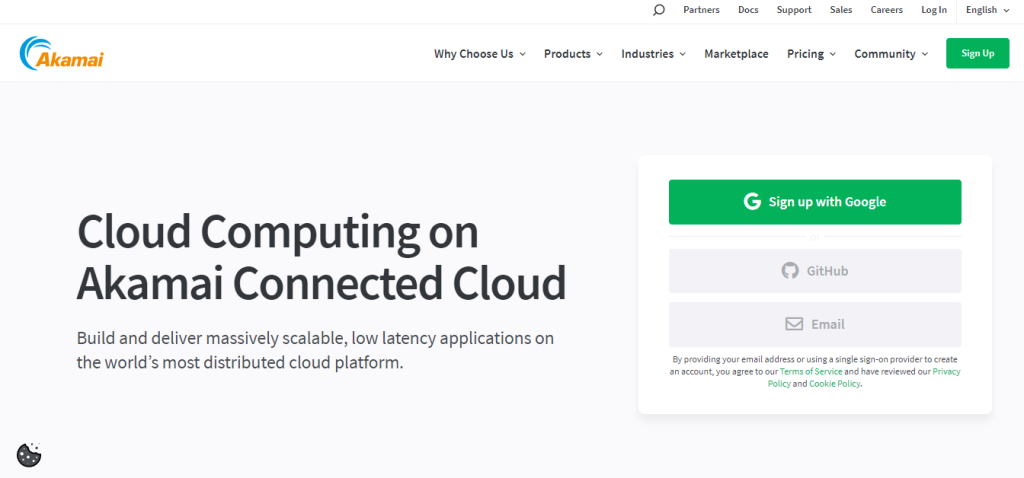
Overview: Linode, now part of Akamai, is a Google Cloud alternative focused on simplicity and affordability. It provides VPS and cloud infrastructure, focused on developer-friendly features. Linode is popular with startups and small businesses. It offers a cheap way to deploy apps.
Key Features:
- Developer-Focused: Linode has a simple API and a user-friendly dashboard. They make it easy for developers to deploy and manage apps.
- Predictable Pricing: Linode's transparent, budget-friendly pricing helps small firms and indie devs.
- Global Data Centers: Linode has data centers in the US, Europe, and Asia. It offers good global coverage for businesses needing reliable cloud infrastructure.
Best For:
- Startups and Developers: Ideal for those looking for a simple and affordable cloud platform.
- Tight-Budget SMBs: Perfect for firms that need a reliable, low-cost cloud.
Also read: Top 10 Linode Alternatives for 2026
9. Vultr
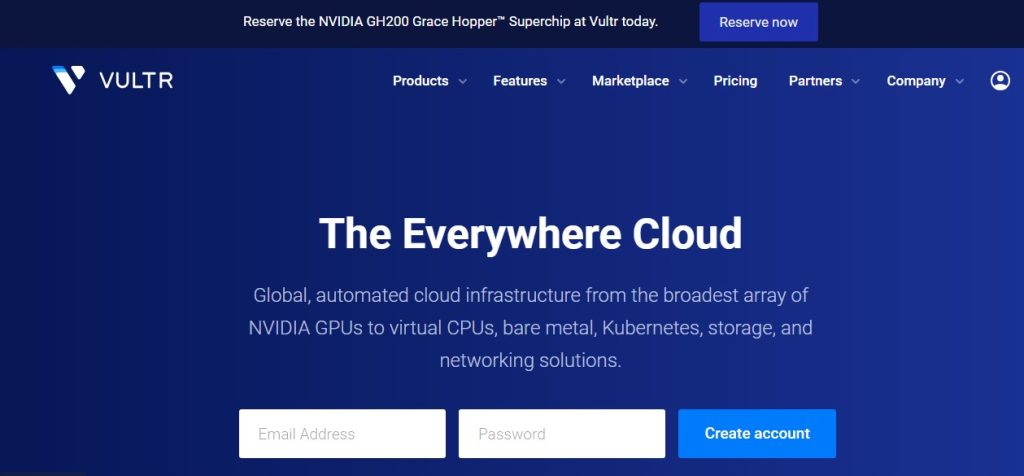
Vultr is a cloud provider. It offers high-performance VMs, block storage, and dedicated instances. It is a great Google Cloud alternative for developers and small businesses. They want something simple and cheap.
Key Features:
- Global Infrastructure: Vultr has data centers in 20+ locations worldwide. This ensures low-latency access for global users.
- Simple Deployment: The platform enables quick deployment of VMs and other services. This makes it easy to scale applications as needed.
- Affordable Pricing: Vultr's simple pricing appeals to cost-conscious developers. They need powerful, budget-friendly cloud solutions.
Best For:
- Developers and Small Teams: Ideal for those needing a fast and easy-to-use platform for testing and deployment.
- Freelancers and indie developers: Ideal for those seeking a cheap alternative to Google Cloud for hosting their projects.
10. Hetzner Cloud
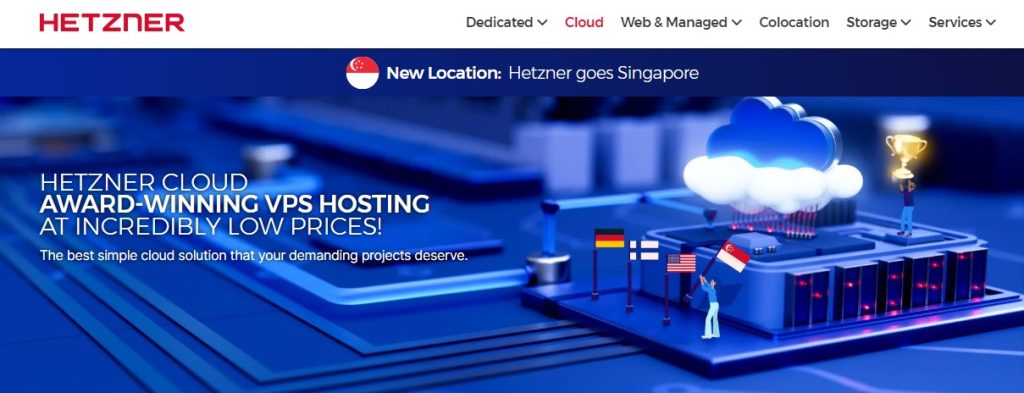
Overview: Hetzner Cloud is a powerful, low-cost alternative to Google Cloud. It offers high-performance virtual servers, storage, and networking services. It is particularly popular in Europe, with data centers in Germany and Finland.
Key Features:
- High Performance at a Low Cost: Hetzner Cloud offers strong performance at a fraction of the cost of larger providers, like Google Cloud.
- Flexible Configuration Options: It offers many server configs. Businesses can select the resources they need without overpaying.
- Data Privacy and Compliance: Hetzner Cloud's data centers are in Germany. It follows strict European data protection laws. So, it's a good choice for companies worried about GDPR compliance.
Best For:
- European Businesses: Perfect for European firms needing to meet data residency rules.
- Cost-Conscious Startups: Ideal for startups wanting high performance at lower costs than big cloud providers.
Finding the Right Google Cloud Alternative
Choosing the right Google Cloud alternative can greatly impact a business's efficiency and scalability. It can also affect its resource management. Google Cloud has great tools. But, many alternatives offer unique strengths. They may be cheaper, have local support, or excel in AI and machine learning. AWS and Microsoft Azure have vast global networks for large enterprises. DigitalOcean, Vultr, and Hetzner serve developers and small businesses with simpler needs.
The best choice depends on a company's needs. These include data residency, performance, and budget. Exploring these options helps businesses find a cloud provider that aligns with their goals. It should balance cost, speed, and functionality to support growth and innovation in 2026.

